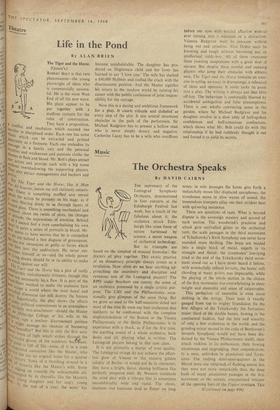T heatre
Life in the Pond
By ALAN BRIEN ROBERT BOLT is that rare phenomenon—the young playwright of ideas who is commercially success- ful. He is the most West End of all the new wave. His plays appear to be put together with a studious concern for the rules of construction.
They have a proposition, a conflict and resolution which succeed one another in disciplined order. Each one has some thesis which can be extracted and printed 3ernParatelY as a footnote. Each one embodies its C ne,,s,age in a family unit and the personal ,-,Yatties and weaknesses and passions clothe the "iernes in flesh and blood. Mr. Bolt's plays attract actors and provide each with a big scene overshadowing the supporting players. theY also attract managements and backers and critics.
p(Vel The Tiger and the Horse, like A Man fir All Seasons, leaves me still curiously unsatis- abe'l There is something muffled and unreal it °Lit the action he presents on his stage. as if fr were filtering dimly to us through layers of te',.s.te1000d glass. There is something mechanical and ' about the twists of plots, the changes aitt1, ilude, the expressions of emotion. Behind heall cannot feel a man cannibalising his own boairt to Paint a series of portraits in blood. Mr. to t seems to have secrets that he is compelled Heaet out behind a thin disguise of greasepaint. rid has not obsessions or guilts or furies which bare hint into the auditorium. He never ern- of ir.asses himself or us—ancl the whole power us lying drama should lie in its ability to make rwitatch against our will. 11413 e Tiger and the Horse has a plot of really rieeelievable melodramatic triteness, though this ibs4 not necessarily be,,,a flaw. It is part of the kliden.Shaw method to make the audience face ouroakccePt a world where the most banal and at dilemmas can still destroy the human Of Superficially, the play shows the effects of',13,hlic political commitment in an atmosphere Of 'ell'Iarly non-attachment—should the Master aoakil Oxbridge College or his wife or his tf"tersign a nuclear disarmament petition Vic. „nlight damage his chances of becoming rjt-k-hancellor? But this is only the first acci- co41 h'arn of light which strikes throulli the Illeable gloom of the academic bacnrater. of Pond is full of life—some of it in a state ilassilsknded animation like the Master, who an't Out out an original feeler for a quarter th century. Some of it threshing around in a Of it °f hsteria like the Master's wife. Some alfedging up towards the unbreathable air, oci.)-1.4ngled by its chrysalis, like the Master's 1.ere ()I-Ing daughter and her angry young At the end of a year, the water has become uninhabitable. The daughter has pro- duced an illegitimate child and her lover has learned to say 'I love you.' The wife has slashed a £40,000 Holbein and stuffed the crack with the disarmament petition. And the Master signifies his return to the modern world by ruining his career with the public confession of joint respon- sibility for the outrage.
Now this is a daring and ambitious framework for a play. It courts ridicule and disbelief at every step of the plot. It sets several enormous obstacles in the path of the performers. Sir Michael Redgrave has to present a hollow man who is never simply dreary and negative. Catherine Lacey has to be a wife who overflows before our eyes with bottled affection without ever turning into a nuisance or a distraction. Vanessa Redgrave [bust be innocent without being wet and spineless. Alan Dobie must be knowing and tough without becoming just an intellectual teddy-boy. All of them overcome these yawning temptations with a great deal of success. But despite these careful and cunning players who jump their obstacles with athletic ease, The Tiger and the Horse remains an exer- cise in acting, an essay in dramaturgy, a rehearsal of ideas and opinions. It never locks its joints into a play. The writing is always just that little off-key. The behaviour is continually blurred by accidental ambiguities and false presumptions. There is one wholly convincing scene in the garden. where Sir Michael Redgrave and his daughter revolve in a slow eddy of half-spoken confidences and half-conscious confessions, which shows what Mr. Bolt could do with this relationship if he had ruthlessly thought it out and forced it to yield its secrets.


































 Previous page
Previous page